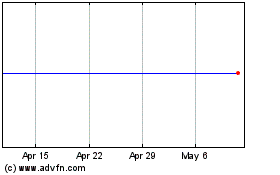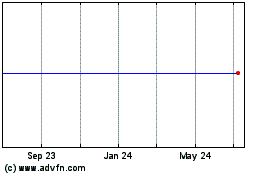By Alexander Osipovich
Direct listings have been embraced by Silicon Valley venture
capitalists and big technology companies. But are they safe for
Main Street investors?
That is the question being raised by some investor advocates,
who say the unorthodox process used by Slack Technologies Inc. and
Spotify Technology SA to go public lacks the safeguards of
conventional initial public offerings.
A direct listing is an alternative to a traditional IPO in which
a company floats its shares on an exchange without hiring banks to
underwrite the offering. That allows companies to save on fees and
bypass some of the restrictions of standard IPOs, such as lockups
that prevent insiders from immediately selling their shares.
While direct listings have been happening quietly for years,
they were limited to small deals until Spotify in 2018 became the
first big company to go public via a direct listing. That spurred
interest in the process from other unicorns, or private firms
valued at more than $1 billion.
"A traditional IPO involves underwriters and other professionals
with deep knowledge of the company -- and clear legal obligations
-- helping to set the terms," said Tyler Gellasch, executive
director of Healthy Markets Association, an investor group. "With a
direct listing, the legal obligations of those setting the prices
are not as clear. That's a new risk for investors."
Investors haven't fared well in the two major direct listings so
far. Slack used the process to go public last June. Since then, the
workplace-messaging company's shares have fallen 40%, while the
S&P 500 has climbed 10%.
Meanwhile, shares of Spotify have gained 1.8% since its debut in
April 2018, well below the 25% increase in the S&P 500 over the
same period. Both Slack and Spotify declined to comment.
The Securities and Exchange Commission is investigating Slack's
direct listing and recent IPOs of tech unicorns at the New York
Stock Exchange, in a probe looking at their first day of trading,
The Wall Street Journal reported on Dec. 20.
The year ahead may bring more of the deals. Airbnb Inc. has
weighed a direct listing, the Journal has reported. The
home-sharing company has said it expects to go public in 2020.
The SEC also is likely this year to rule on a proposal from NYSE
to let companies use direct listings to raise capital, a plan that
could make the process appeal to a broader array of firms eyeing
the public markets.
Under current NYSE rules, companies can only use direct listings
to sell existing shares, not to issue new shares and sell them to
the public. That effectively limits the process to a small number
of cash-rich companies that don't need to raise new funds but want
to allow early investors and insiders to cash out.
In early December, the SEC rejected an initial version of NYSE's
proposal, but the exchange resubmitted it with minor changes and
the commission is reviewing the plan.
The Big Board's proposal raised red flags with some groups, who
said it would create a lightly regulated version of the IPO that
could be exploited by poorly managed or fraudulent companies.
"This would be a complete end run around the traditional
underwriting process, and it would create a massive loophole in the
regulatory regime that governs the offerings of securities to the
public," the American Securities Association wrote in a Dec. 12
letter to SEC Chairman Jay Clayton. ASA represents smaller
financial-services firms, including some that underwrite IPOs.
The group noted that underwriters in a traditional IPO are
liable for misrepresentations and omissions in the process, but
with direct listings, the rules around liability are unclear. The
SEC should ensure that financial advisers, exchanges and company
insiders face liability for similar problems in direct listings,
ASA wrote in its letter.
A spokesman for the NYSE said companies using direct listings
face many of the same standards that apply in standard IPOs.
"Companies are required to follow established processes similar
to an IPO, which include filing a registration statement with the
SEC, meeting NYSE listing standards, and participating in a robust
and transparent price discovery process," he said.
An SEC spokeswoman declined to comment on NYSE's proposal.
Companies face "significant disclosure and procedural obligations"
that apply to both IPOs and direct listings, she said, adding: "We
expect issuers to adhere to those obligations."
One difference between IPOs and direct listings is how they are
handled in court when aggrieved shareholders sue companies.
That is the focus of a brewing legal battle over Slack.
Investors are suing the company in California federal court,
alleging it failed to fully disclose certain risks when it sold
securities.
Such lawsuits are common and seen as a nuisance by many U.S.
companies. But Slack's response has been novel, drawing on the fact
it went public through a direct listing.
The company says it shouldn't be held liable under Section 11 of
the Securities Act of 1933, a provision that underpins many
shareholder suits. That is because when Slack went public,
investors bought a mix of shares covered by the company's
registration statement filed with the SEC and other shares that
hadn't been registered because they were sold by Slack insiders
rather the company itself, Slack said in a November court
filing.
Because the investors suing Slack can't directly trace their
shares to the registration statement, the suit should be dismissed,
the company argued. Slack also said the plaintiffs can't seek
damages because there was no offering price in its direct listing,
which would determine how much money the plaintiffs had lost.
A win for Slack in the arcane dispute could help establish
direct listings as a way for companies to duck lawsuits, said
Francis McConville, a partner with Labaton Sucharow LLP who
represents shareholders in lawsuits against companies but isn't
involved in the Slack case.
"The danger, from an investor-protection and market-transparency
standpoint, is that direct listings could be seen as a tool for
companies to sidestep Securities Act liability," he said.
-- To receive our Markets newsletter every morning in your
inbox, click here.
Write to Alexander Osipovich at
alexander.osipovich@dowjones.com
(END) Dow Jones Newswires
January 03, 2020 05:44 ET (10:44 GMT)
Copyright (c) 2020 Dow Jones & Company, Inc.
Slack Technologies (NYSE:WORK)
Historical Stock Chart
From Jun 2024 to Jul 2024

Slack Technologies (NYSE:WORK)
Historical Stock Chart
From Jul 2023 to Jul 2024
